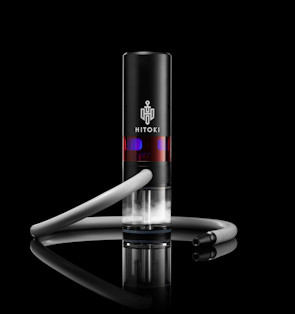
Eli Dafaria / Unsplash
What Does Cannabis Do To Your Lungs?
Marijuana isn't associated with the same harms as tobacco, but can it still cause lung cancer? Read up and spread the word. Created with Hitoki.
We all know it—smoking isn’t a healthy habit.
But what about cannabis? Cannabis smoke contains many of the same carcinogens as cigarettes. But, smoking the herb is not associated with the same risk of lung disease. At least, according to current research.
That doesn’t mean that cannabis smoke is healthy, though.
If you’re wondering what cannabis does to your lungs, check out this guide we made with Hitoki, the creators of the revolutionary Trident, with everything you need to know about weed and lung cancer.
Why The Trident Is The Safest Way To Smoke

Photo courtesy of Hitoki
This one-of-a-kind gadget is the latest in smoking technology out there and the accessory you should get if you want to reduce the harm done to your lungs.
What sets the Trident apart is its laser combustion technology. It’s akin to lighting your bong with the sun and a magnifying glass, but in a sophisticated and classy device that heats up in seconds.
Laser combustion eliminates the need for butane lighters which produce nasty chemicals that harm your respiratory system.
Besides, it lets you taste the full flavor of your flower without it being altered, giving you the ultimate experience. The Trident is the future of smoking and the product you need if you want to protect your lings without reducing your consumption.
Does Smoking Weed Cause Lung Cancer?
Now that we know the best way to smoke weed let’s get to the point, does smoking weed cause lung cancer?
While it may come as a shock to some, there is no conclusive evidence that smoking cannabis causes lung cancer. This finding is a bit counter-intuitive, as tobacco smoke is the culprit behind 80 to 90 percent of lung cancer cases.
But don’t celebrate just yet.
It’s certainly possible that prolonged and protracted cannabis smoking may contribute to some types of cancer. Right now, however, no large-scale studies have proven a definitive link.
A 2014 review published in the International Journal of Cancer, for example, crunched data for six separate studies. In total, the studies included 2,159 lung cancer patients and 2,985 healthy controls. No small number, right?
The results of the study came as a surprise for researchers. There was little correlation between long-term cannabis smoking and lung cancer.

Photo by Alexander Belinskiy / Adobe Stock
The study authors write:
“Results from our pooled analyses provide little evidence for an increased risk of lung cancer among habitual or long-term cannabis smokers, although the possibility of potential adverse effect for heavy consumption cannot be excluded [emphasis added].”
Other analyses show similar findings, failing to find evidence that supports a causal connection. The lack of a link between cannabis and lung cancer is a little odd—lung biopsies from chronic cannabis consumers feature the same precancerous cells found in tobacco smokers.
According to some researchers, the big difference is that the cannabis plant also contains compounds—notably THC—that may slow the development and spread of some types of cancer cells.
What About Vaping?

Giorgio Trovato / Unsplash
Vaping is by far the safest way to inhale cannabis, ONLY if you’re purchasing from a licensed and reliable retailer that uses third-party labs for testing. We all remember the 2019 vape crisis that hospitalized kids for smoking vape products with harmful Vitamin E Acetate.
That said, vaping a safe concentrate has become one of the more popular and safer methods of ingestion. Vaporization is the process of heating cannabis oils or flower below the point of combustion. Instead of creating a cloud of smoke, cannabis oil melts into an inhalable gas.
True vaping is much gentler on the lungs than smoking. Vaporization reduces the number of toxins and carcinogens when compared with smoking. Low temperature vaping also avoids scalding lung tissues, which irritates over time.
As two New York researchers explain, “vaporizers show promise for cannabis users who want to avoid pulmonary problems and prefer a more rapid onset than edibles provide.”
Vape temperature has an oft-overlooked effect on lung health. Not only can hot temperatures irritate the delicate tissues of the lungs, but high temperatures can transform a safe vape product into a toxic one.
At high temperatures, cannabis products are more likely to combust instead of transforming into an aerosol vapor. Additionally, the higher the temperature, the more likely metal contaminants from the vaporizer itself leak into your vapor.
An ideal vaporizer will not heat cannabis products higher than 446℉ (230℃), the point at which cannabis products may begin to combust. At this temperature, toxic gasses can release from vape cartridge additives. The ratio of active cannabis compounds to potential toxicants also begins to tip around this temperature. Go any higher than 446℉, and you might inhale more toxins than cannabinoids.
Herb Recommended Products:
READ MORE











